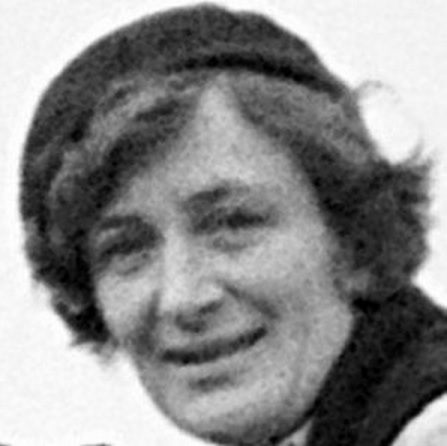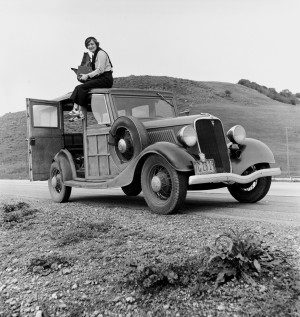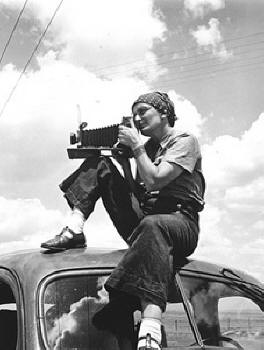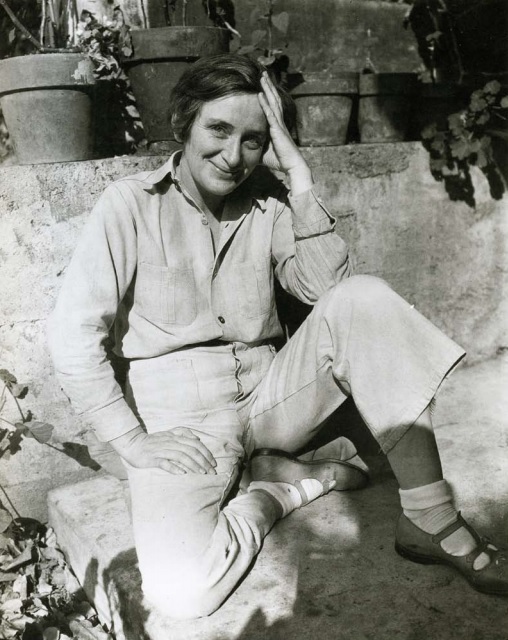
WASHINGTON COUNTY HISTORICAL SOCIETY (Washington County, Utah)
DOROTHEA LANGE
(famous photographer who took pictures in dixie)
BIOGRAPHY
Dorothea Margaretta Nutzhorn was born on May 26, 1895, in Hoboken, New Jersey. Her parents were second generation German immigrants, Heinrich Nutzhorn and Johanna Lange Nutzhorn. At the age of 7, Dorothea contracted polio which left her with a weakened right leg and a permanent limp. When she was 12, Dorothea and her mother were abandoned by her father. Dorothea dropped her middle and last names, taking on her mother's maiden name, thereafter being known as Dorothea Lange.Dorothea attended schools in New York City. She graduated from Wadleigh High School for Girls and studied photography at Columbia University.
In 1918, Dorothea and a girlfriend left New York to travel the world. They only got as far as San Francisco before a robbery ended that dream. The Bay Area (mostly Berkeley) remained Dorothea's home for the rest of her life.
In 1920, Dorothea married Maynard Dixon, a noted western painter. They had two sons, Daniel (1925-????) and John (1930-????). But in 1935, Dorothea divorced Maynard to marry Paul Schuster Taylor. He was a Professor of Economics at U. C. Berkeley and they shared and interest in documenting the poverty of the time.
Dorothea was involved with photography professonally all her life. She learned the studio business and soon had her own portrait studio. During the depresson years, she got interested in photographing the human condition during that time. The led to her being employed by the federal Resettlement Administration (later called the Farm Security Administration). During the World War II, she was hired by the Office of War Information to photograph conditions in the Japanese-American internment camps. In 1945, Ansel Adams arranged for Dorothea to join the faculty of the California School of Fine Arts. Then in 1952, Dorothea Lange and Pirkle Jones founded a photographic magazine, Aperture. Dorothea took a number of different photographic commissions.
In the summer of 1933, Dorothea Lange and her husband, Maynard Dixon, went camping and working in Zion National Park. They boarded their two young sons with a family in Toquerville. Dorothea took photographs and Maynard did paintings.
Dorothea received a Guggenheim Foundation fellowship in 1941. She intended to use it to photograph Mormon towns in southern Utah, however a family crisis and then World War II got in the way of those plans. But she never gave up the idea.
In August of 1953, Dorothea Lange and her long-time friend, Ansel Adams, met up in southern Utah and spent three weeks photographing landscapes and people in Gunlock, Toquerville, and St. George. They took hundreds of photographs with the intent of publishing some of them in Life Magazine.
From that collection, Dorothea composed an extended essay of 135 photos which she submitted to Life Magazine. The magazine selected 35 of those photos for publication, ignoring the ones my Ansel Adams. The photos, along with text by her son, Daniel, were published in an article entitled, "Three Mormon Towns", in the September 6, 1954 issue of Life Magazine. There was some controversy about the article since some of the subjects of the photos had not been told the photos were intended for publication.
The BYU Museum of Art held an exhibit of Dorothy Lange's photographs from January 17 through April 30 of 2011. The title of the exhibit was, "Dorothea Lange's Three Mormon Towns". Sixty two photos from Lange's extended essay were selected for the exhibit. Only one of Adams' photos (a long distance view of Toquerville) was included. BYU purchased 21 of the images from the Lange family, while the others were on loan from the family, the Museum of Contemporary Photography in Chicago, and the J. Paul Getty Museum.
Mark Hedengren decided to revisit those same three southern Utah towns in 2011. He published a book in 2012 titled, " Ansel Adams and Dorothea Lange's Three Mormon Towns", that included Adams' and Lange's original images besides 22 of his own contemporary photographs of the same places.
After suffering from various health problems for a number of years, Dorothea died of cancer on October 11, 1965 in San Francisco, California. She was cremated and her ashes were scattered.
PHOTOS

|
 |

|
REFERENCES
Three Mormon TownsArticle with text by Daniel Dixon and photographs by Dorothea Lange and Ansel Adams
Life Magazine, September 6, 1954, pp. 91-100
Excerpt on Gunlock
Video of Dan Dixon talking about Dorthea Lange's Three Mormon Towns
News Release: Dorothea Lange photos of Utah towns next BYU MOA show
Show ran from January 21, 2011 through April 30, 2011
BYU exhibit revisits Dorothea Lange's 'Three Mormon Towns'
Article by Brian Maffly
Salt Lake Tribune, January 17, 2011
Ansel Adams and Dorothea Lange's Three Mormon Towns
Book edited by Mark Hedengren 2012
http://www.markhedengren.com/threemormontowns
In a Rugged Land: Ansel Adams, Dorothea Lange,
and the Three Mormon Towns Collection, 1953-1954
Book by James R. Swensen, 2018
Book review: 'Three Mormon Towns' celebrates southern Utah life
Review by Rosemarie Howard
The Deseret News, November 10, 2013
Audio interview with Mark Hedengren about the background of "Three Mormon Towns"
On BYU Broadcasting's "Thinking Aloud"
Origionally broadcast on August 19, 2013
Biographies of Dorothea Lange
Dorothea Lange: A Photographer's Life
Book by Milton Melter
1978
Wikipedia entry for Dorothea Lange
Encyclopedia.com biography of Dorothea Lange
Dorothea Lange Biography: Photographer (1895-1965)
An excerpt from Daring to Look: Dorothea Lange’s Photographs and Reports from the Field
by Anne Whiston Spirn
Dorothea Lange (1895-1965): Living Life through a Camera
Find-A-Grave entry for Dorothea Margaretta Nutzhorn Lange